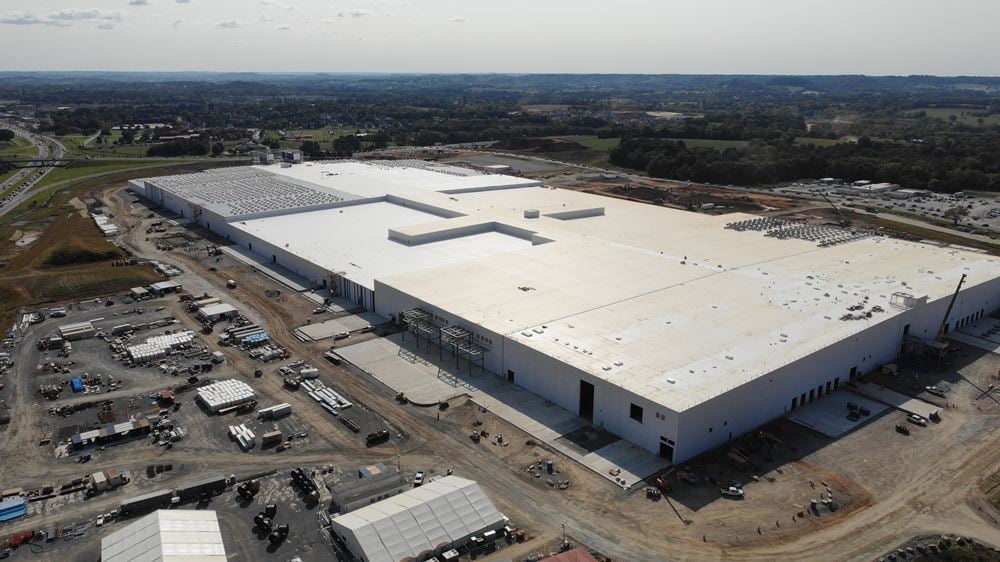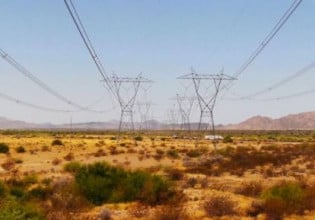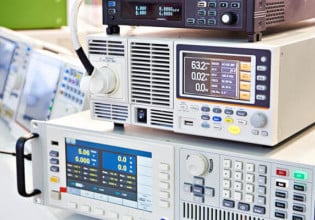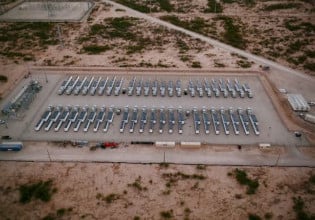GM, LG Energy Solution Add $275M to Tennessee Battery Cell Plant Investment
General Motors and LG Energy Solution are committing another $275 million to expand their $2.3 billion battery cell plant in Tennessee. Construction is underway, with production expected in 2023.
Michigan car giant General Motors and South Korean battery producer LG Energy Solution recently unveiled plans to invest $275 million to expand their battery cell plant in Tennessee. This figure adds to the pair’s existing $2.3 billion commitment upon announcing the facility in the spring of 2021. The U.S. Department of Energy has just closed a $2.5 billion loan to Ultium Cells to help finance the construction.
Ultium has a battery cell plant in Tennessee. Image used courtesy of Ultium Cells LLC
Through their Ultium Cells LLC joint venture, the two companies plan to increase the facility’s cell output by more than 40%, from 35 gigawatt-hours (GWh) to 50 GWh. This would represent nearly a third of Ultium Cells’ total capacity target of 160 GWh across its three battery plants, plus a fourth undisclosed site.
Ultium Cells’ first $2.3 billion cell plant in Warren, Ohio, started production in August 2022 with over 40 GWh of annual capacity. Another $2.6 billion plant in Lansing, Michigan, is expected to bring 50 GWh of capacity when production starts in 2024.
According to Reuters, GM and LG Energy Solution are reportedly eyeing Indiana as a contender for a fourth battery site.
Situated about 35 miles south of Nashville, the 2.8 million-square-foot facility will be in close proximity to GM’s existing assembly plant in Spring Hill. The new cells will be installed in GM’s all-electric Cadillac LYRIQ SUV and other electric vehicles powered by GM’s Ultium battery platform.
Cell production is on track to start in late 2023. The plant is expected to add 1,700 new jobs when fully operational. Next door, GM’s 2,100-acre assembly plant currently employs over 3,500 people, per the company’s website.
For its part, LG Energy Solution is expanding its supply chain to source more of its battery raw materials in the United States. With a sizable American footprint and as a notable stakeholder in the federal government’s domestic manufacturing subsidies, the company plans to localize 72% of critical metals sourcing (including lithium and other major cathode materials) within five years.
The Seoul-headquartered company stated in October 2022 that it had secured 250 to 260 GWh of production capacity in North America by 2025, including its joint venture plants with GM and other original equipment manufacturers such as Honda and Stellantis. As of September 2022, 70% of its order backlog was concentrated in North America.
Spring Hill Expansion Supports Ongoing Growth of GM’s EV Business
The Spring Hill expansion supports GM’s ambitious EV push. By 2025, the Detroit-based company plans to reach more than 1 million units of North American EV capacity, while adding 30 new electric models globally. It has earmarked some $35 billion to get there, including spending billions on upgrading its existing assembly plants to manage increased EV production. That also includes a $2 billion investment in 2020 to transform its Spring Hill assembly plant into an EV manufacturing hub.
This photo from September 2022 shows construction progressing at GM’s upcoming battery cell plant in Spring Hill, Tennessee. Image used courtesy of Ultium Cells LLC
The company’s EV sales have surged in recent months, consistent with the broader market trends taking shape in 2022. GM closed the third quarter with record sales in its Chevrolet Bolt EV family (14,709 units), prompting the company to ramp up production from 44,000 vehicles to more than 70,000 in 2023.
In its quarterly earnings, GM said that demand for the Bolt EV and Bolt EUV had outpaced supply as a new pricing strategy made the vehicles more competitive. (Per Chevrolet’s website, the manufacturer’s suggested retail price of the 2023 Bolt EV starts at $25,600, while the 2023 Bolt EUV starts at $27,200.)
Reservations are up across GM’s most popular brands. As of the third quarter, the Chevrolet Silverado EV had more than 170,000 reservations from retail customers and fleet operators. GMC’s Hummer EV pickup and SUV accounted for another 90,000 reservations. The company expects more sales growth as its Cadillac LYRIQ production ramps up in the fourth quarter.








